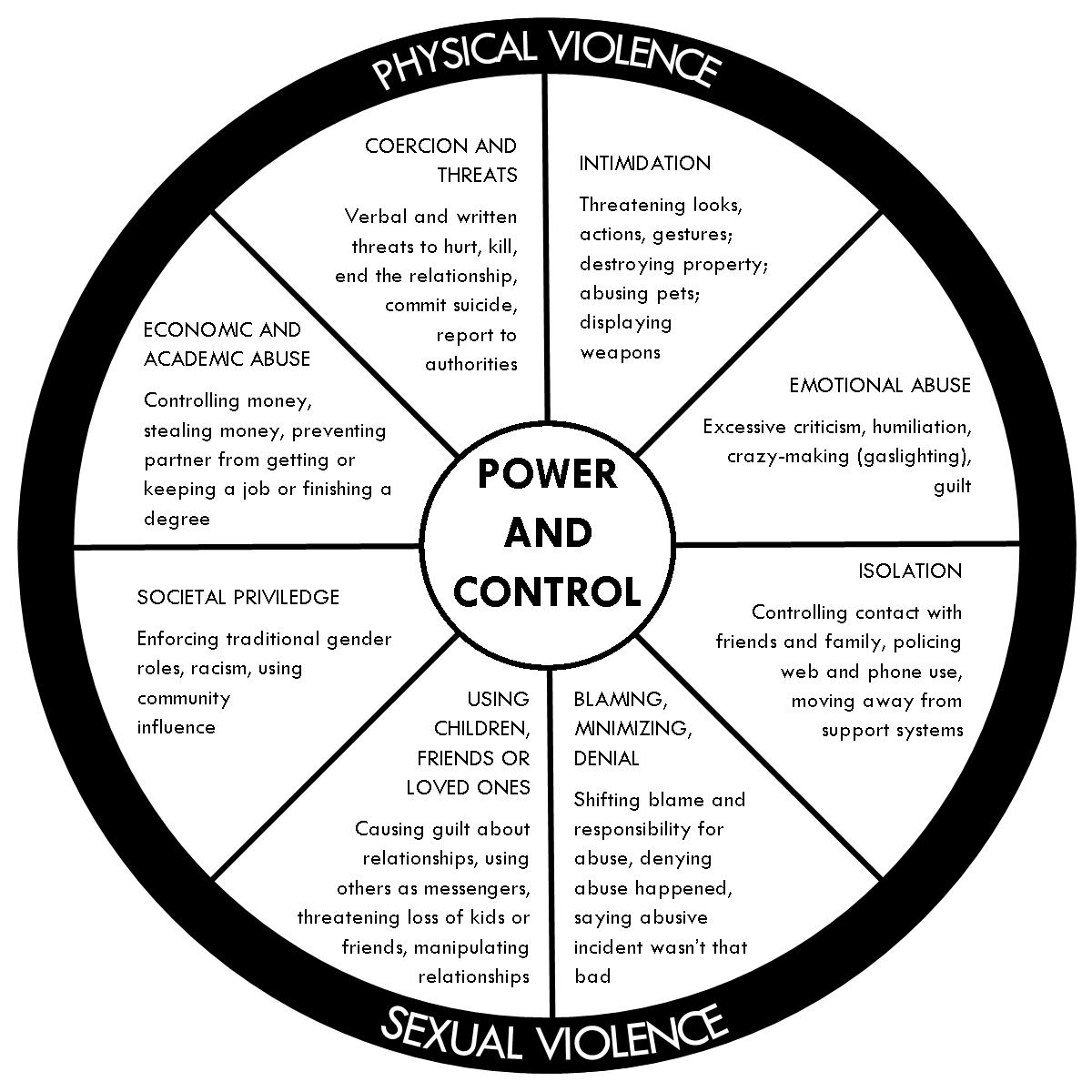Domestic/Intimate Partner Violence
Domestic Violence affects people of all different ages, gender identities, sexual orientations, abilities, races, ethnicities, religious backgrounds, income levels, and amount of education. In order to best support survivors, we must recognize our stereotypes and withhold judgment when survivors share their experiences with us.
What is Domestic/Intimate Partner Violence?
A pattern of violent and coercive behaviors used to gain and maintain power and control over their intimate partner. Abuse can be emotional, psychological, financial, physical and sexual. The power and control wheel below shows some common tactics used by abusers, however we know that each relationship is different and abusive partners will use individual vulnerabilities as a form of control. No one deserves to be abused.

Is My Relationship Abusive?
If you feel you may be in an abusive relationship, call our 24 Hour Hotline and talk with an advocate about your concerns. The questions below may also be indicators of an abusive relationship.
Does Your Partner?
- Call you names, yell or put you down?
- Become very jealous?
- Keep you away from your friends and family?
- Threaten to reveal personal information or photos?
- Look through your phone, email or social media without your permission?
- Threaten to disclose your sexual identity?
- Control the money?
- Interfere with your job, school or classes?
- Scare you or get really angry to get you to do what they want?
- Make you afraid by the way they look or talk to you?
- Hurt your body or break your things?
- Hurt you, your children, pets, family members and/or friends?
- Threaten to hurt themselves if you try to break up with them?
- Make you have sex when you don’t want to?
- Grab, push, hit, punch, kick, choke or bite you?
Why is it difficult to leave an abusive relationship?
For someone who has never experienced domestic violence, the question of why a victim stays with an abusive partner can be very difficult to understand. There are many reasons why it might be hard to leave an abusive relationship and by design an abusive partner can make their victim feel trapped and in that relationship.
To learn more about Domestic Violence and how victims get trapped visit:
Office for the Prevention of Domestic Violence- Understanding the Problem
If you are in an abusive relationship and/or are considering leaving it is critical to have a plan for your safety. Safety plans are very individual and must be based on your personal resources, needs and choices. For example, a married person with children will have different needs than a college student living on campus. Advocates can help you make an individualized plan, to talk with an advocate call our 24 Hour Hotline at (607) 277-5000.
To learn more about safety plans visit:
Office for the Prevention of Domestic Violence- Getting Safe
A common piece of a safety plan is using the police or courts to request and Order of Protection. An order of protection is a document issued by a court that may help protect you from harassment or abuse. In an order of protection, a judge can set limits on your partner’s behavior. Among other things, judges in all courts (Criminal, Family and Supreme courts) can:
- order your partner to leave and stay away from your home, your workplace, and your family (this is called a “stay-away” provision);
- order your partner to stop abusing you, your children, and your pets; and
- order your partner to have no contact with you – including no phone calls, letters, e-mails, or messages through other people.
For more information about the police and orders of protection:
Office for the Prevention of Domestic Violence- Police, Courts, Orders of Protection
Teens & College Students
Dating Violence is unfortunately very common among teens and college students with research showing women aged 16-24 being at the highest risk for non-fatal dating violence. It is important to recognize that dating violence can look very similar to any other form of domestic violence and can have just as serious consequences. The Advocacy Center is here to help.
Teens can receive support and services from our advocates without parental permission. College students can access services with no information being shared with the campus or parents without expressed permission. To speak with an advocate call our 24 Hour Hotline now.
To learn more about about Dating Violence, Resources Available and what a healthy relationship looks like visit:
Love is Respect
Domestic Violence in the LGBTQ Community
Research has consistently shown that intimate partner violence occurs at the same rates in same-sex relationships as in heterosexual relationships. We also know that while the dynamics and many forms of abuse in same sex relations are the same there can also be additional forms of abuse and barriers to finding safety. This highlights the critical importance of supporting survivors, regardless of their gender identity or sexual orientation. The Advocacy Center provides a safe space for LGBTQ identified survivors to receive informed and compassionate services regardless of their gender identity or sexual orientation. To speak with an advocate call our 24 Hour Hotline.
To learn more about Intimate Partner Violence in the LGBTQ identified community visit:
VAWnet: Preventing and Responding to Domestic Violence in Lesbian, Gay, Bisexual, Transgender, or Queer (LGBTQ) Communities